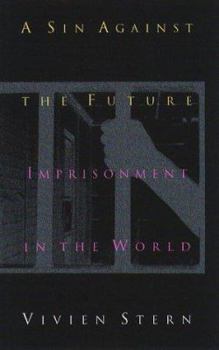A Sin Against the Future: Imprisonment in the World
Select Format
Select Condition 
Book Overview
Vivien Stern contends that prisons, a mainstay of punishment, are an anachronistic and probably counterproductive system for dealing with rising crime rates. Arguing that inherent flaws in the institution of prison threaten democratic values and fail to meet the needs of modern society, she makes a powerful case for implementing radical change.
Stern first discusses the evolution of imprisonment and then explores how different areas of the...
Format:Paperback
Language:English
ISBN:1555533612
ISBN13:9781555533618
Release Date:October 1998
Publisher:Northeastern University Press
Length:432 Pages
Weight:1.10 lbs.
Dimensions:1.3" x 5.1" x 8.0"
Grade Range:Postsecondary and higher
Customer Reviews
2 ratings
Opening our eyes to the barbaric treatment in America
Published by Thriftbooks.com User , 24 years ago
I had this book sent to a highly educated individual whom is currently in prison. He wrote " 'A Sin Against The Future' is EXTRAORDINARY! It is an exceptionally well written book. The U.S. and Russia stand far alone in per-capita incarceration. As the author points out, this has an historical genesis in Russia but is unprecedented in the history of the world for the U.S." He went on to write two whole pages about this book. He clearly thought it to be excellent and truthful reading.
Excellent alternatives to prisons
Published by Thriftbooks.com User , 26 years ago
This is one of the best books I've read about prisons, and the one which goes farthest toward suggesting how they could be minimized (not eliminated). My first encounter with the idea that prisons might be a bad idea was in reading Michel Foucault's Discipline and Punish (1975). He spoke of alternatives or substitutes for prison, and also for factories, schools, barracks, and hospitals, all of which he said resembled prisons. But he said not one word about what such alternatives might be, and his style struck me as pretentious. So I didn't pay much attention. I believed, of course, that we ought to have been devoting much more time and money to alleviating poverty, educating children and adults, providing decent homes and medical care, training people for enjoyable jobs, treating the mentally ill and those addicted to drugs. I believed that we in America were wrong to allow people to live in horrible conditions, to supply everyone with guns, and then to address crime after it happened. But I didn't think much about the way in which we addressed it. I did have some general, vague, and ill-informed complaints with our approach to punishment. I rejected the common demand for vengeance and the philosophical demand for justice (a.k.a. vengeance) as barbaric and counterproductive. I was disgusted by the fact that our government supported crime victims in believing that they could be helped by seeing criminals suffer. I opposed the death penalty because there was no evidence that it deterred crime, saved money, or helped to civilize anyone. The whole idea of vengeance seemed to conflict with reducing crime in many ways. Those "mentally incompetent" often couldn't be confined for society's protection, and couldn't be given the help they needed if they were confined. Restitution was never made to victims or communities, because those who ought to have been making it were locked away as monsters. I didn't yet understand the degree to which prison trains those monsters to be monsters, and teaches people to see society as an enemy and themselves as wrongly treated. Nor was I aware how little evidence there is that prison (not just the death penalty) deters crime. I wasn't aware how unlikely recidivism is in many cases, or how small a percentage of prisoners had been convicted of violent crimes. I didn't know how large a percentage of prisoners are mentally ill or addicted to drugs. Nor did I have much idea what went on in prisons, how torturous imprisonment is, how solitary confinement produces insanity, how common rape and murder are in our prisons. Nor did I know anything about our recently developed private prison industry, an industry without the competition of the free-market, but also without the accountability or financial stability of the government. We now build unneeded prisons in the hopes that prisoners can be found to make them profitable. And there are alternatives. Imprisonment is high





